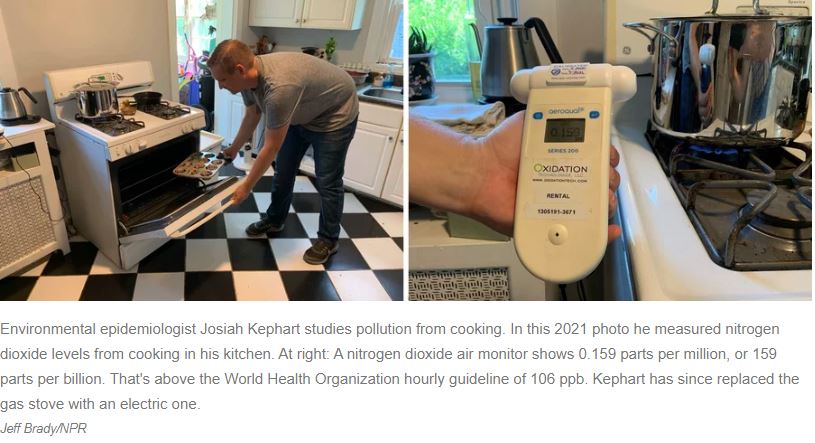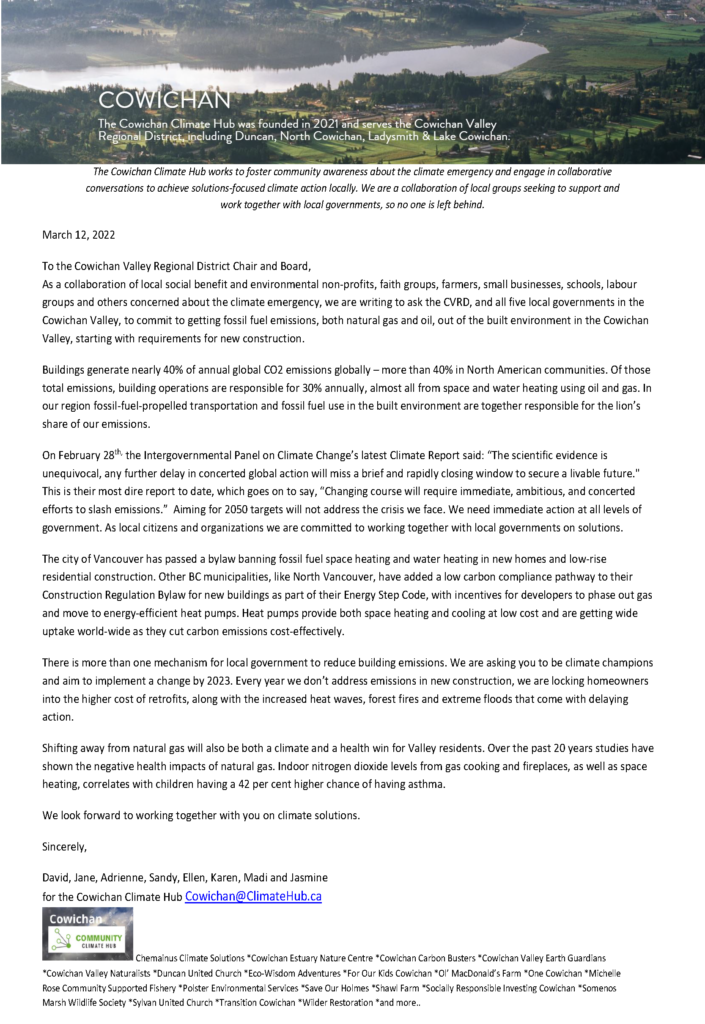
The Cowichan Climate Hub works to foster community awareness about the climate emergency and engage in collaborative conversations to achieve solutions-focused climate action locally. We are a collaboration of local groups seeking to support and work together with local government so no one is left behind.
Transition Cowichan is pleased to be one of the founding groups of the Cowichan Climate Hub – a diverse group of social benefit and environmental non-profits, faith groups, farmers, fishers, small businesses, schools, labour groups and others concerned about the climate emergency – who want to engage constructively with local government and move our communities toward solutions that make a difference. Climate change, and the increasing weather extremes it’s bringing our way, affect just about everything in our lives – food security, housing, our mental and physical health.
The Cowichan Climate Hub has the following purposes:
• to foster increased community awareness about the climate emergency;
• to engage in collaborative conversations, including with local governments, First Nations and others, to achieve increased solutions-focused climate action locally; and
• to work together as a community and with local government so no one is left behind.
The Cowichan Climate Hub is part of Canada’s Climate Hub Network which supports over 1200 non-partisan local climate initiatives in 600 communities and regions across Canada with tools and resources to coordinate our efforts to maximize our impact in addressing the climate crisis.
Some history: In the the Spring of 2019, led by local non-profit One Cowichan, 49 local groups, churches, unions and businesses sent letters to our five Cowichan governments, asking them to declare a climate emergency and take timely, effective action to meet this crisis. Duncan, North Cowichan, the Cowichan Valley Regional District (CVRD), Ladysmith and Lake Cowichan all declared or in some way acknowledged that we are in a climate emergency. This was an encouraging beginning, and follow-up action was slower in coming, while climate impacts continued to grow. In August 2019, One Cowichan issued a 10-point check list to measure local governments’ climate progress and, in August 2020, after some basic systems were in place to address the COVID-19 pandemic, we had grown to a group of 55 concerned local groups and wrote again to local governments asking them to renew their focus on timely and meaningful climate action in our communities.
Early in 2021 we came together as the Cowichan Climate Hub.
Despite COVID leading to the climate conversation losing some momentum, we learned that together we can mobilize locally to address both a health and climate emergency. We decided to engage with local governments in support of Official Community Plan (OCP) renewal processes underway in our local municipalities and our region. It was a critical time to demonstrate the broad support that does exist for stronger climate action across all sectors of our communities and help local politicians find the motivation and courage to act with the urgency needed.
In August 2022, supported by its Environmental Advisory Committee, North Cowichan passed an inspiring OCP grounded in the principles of planning for social & ecological well-being taken from economist Kate Raworth’s “Doughnut Economics”, which brings lenses of equity, climate and ecosystem health, and well as sound economics, to community decision-making. The OCP engagement processes at the CVRD and the other three local governments within our region are ongoing opportunities for local groups and individual citizens to engage and advocate for the urgent action needed in this climate emergency.
Join us and others to build a strong Cowichan Climate Hub. Add your voice to those of others concerned about the climate emergency who want to move our communities toward solutions that make a difference. Climate change, and the increasing weather extremes it’s bringing our way, affect just about everything in our lives – food security, housing, our mental and physical health, how we get around our communities.
Are you a part of a group interested in joining a local, constructive and collaborative conversation about climate solutions here at the local level? Want to be on the Hub’s email list to keep up-to-date, offer input, attend our Climate Cafes and help with events? Contact the Cowichan Climate Hub at cowichan@climatehub.ca to find out more. If your group, church, farm or business is ready to join us at the Cowichan Climate Hub, send us an email or sign up here.
The Cowichan Climate Hub is now engaging with and presenting delegations to all five local governments in the Cowichan Valley, asking them to use BC’s Zero Carbon Step Code. Here is our November 2023 update.
THE COWICHAN CLIMATE HUB’S CAMPAIGN to DECARBONIZE COWICHAN’S BUILT ENVIRONMENT
Buildings in North American cities and towns generate about 40% of those cities and towns’ annual CO2 and CH4 (methane) emissions(1), the main drivers of climate disruption. Most of those emissions come from space and water heating using fossil gas, and from gas stoves and fireplaces. Right now, the use of fossil (methane) gas, euphemistically called “natural gas,” by companies like Fortis, continues to expand in new construction in our province and community. Fortis calls gas a “transition fuel”. It’s not. Methane emissions are 80X more potent as a greenhouse gas than C02 across a 20‐year period (2), and data on the prevalence of gas leaks now shows that gas emission are at least, if not more, damaging to climate stability than coal.
Health studies, beginning in the 1970s and into the present, link gas use in homes with the increased incidence of asthma and respiratory infections, especially in children. The most recent health studies now also show significant increased risk of childhood leukemia, in addition to respiratory illness, from methane gas in the home (3).

Reducing methane emissions is critical as it has the most severe and immediate climate impact of any fossil fuel, driving temperatures higher faster here and around the globe, and accelerating the damaging and dislocating climate impacts we’re experiencing in our communities, and on our health and wellbeing. Electrification is the clean, healthy, and economic alternative to fossil gas in buildings. With the accelerating pace and intensity of climate impacts and the documented health risks of gas, it’s time for local governments to support our communities in switching away from gas, starting with new construction using BC Zero Carbon Step Code.
The BC government has now given local governments the tools to decarbonize and electrify new buildings. BC’s Zero Carbon Step Code(4), which came into force on May 1, 2023, enables local governments to pass bylaws that require lower emissions, up to full electrification in new buildings. On Vancouver Island the Municipality of North Cowichan, the Cities of Nanaimo and Victoria, and the District Municipality of Saanich have already adopted Zero Carbon bylaws at level EL4 of the new Zero Carbon Step Code for new buildings. In Victoria the highest step of the Zero Carbon Step Code was implemented(5) as of July 1, 2023, for all building permits submitted for Residential (Group C ‐ up to 6 stories) needing to meet both Energy Step Code 3 and Zero Emission Step Code 4 (full electrification), and as of November 1, 2023, for all building permits submitted for residential buildings over 6 stories and commercial buildings (Group D and E).
Saanich has put in place the same dates and requirements as Victoria. The implementation dates for zero carbon building permits under Zero Carbon bylaws in Nanaimo and North Cowichan are July 1, 2024. The Code does allow wood stoves or gas fireplaces for backup use during power outages. An added benefit of full electrification is that heat exchangers/pumps provide both heating and cooling(6), something that fossil gas can’t provide. This is so important as, year after year, we’re experiencing longer and hotter heat waves which bring increasingly life‐threatening health risks.

Having municipalities here on the Island who’ve already applied zero carbon bylaws to new construction gives momentum to other local governments like ours to implement similar bylaws. It also means Nanaimo, Victoria, and Saanich, are now sources of advice and support for our five local governments here in the Cowichan Valley as they implement these bylaws and engage in dialogue with contractors and builders, many of whom are the same contractors who build both here and in the south and mid‐Island communities where zero‐carbon bylaws are already in place.
Retrofitting existing buildings to eliminate fossil fuels is also needed from a health and safety perspective, as extreme heat waves become more common and more intense. Repeated high temperature events like the 2021 BC Heat Dome must not be allowed to take the tragic death toll we saw that June, with over 600 deaths in BC. We need our local governments to prioritize programs that supplement existing federal and provincial support, to get heat pumps, with their ability to provide effective cooling as well as heating, into the rental homes and apartments(7) of our most vulnerable and economically‐challenged community members. More broadly, these environmental building retrofits will reduce emissions further, in ways that both local governments and the Province need in order to meet their 2030 climate commitments.
Retrofits will almost certainly be more expensive than new construction, so the sooner new construction is required to be Zero Carbon the more money individual families and local government will save, the healthier we will be, and the more impact we will have as we do our part to reduce emissions and slow the damage caused by this accelerating climate emergency. Everything we do to reduce emissions locally, provincially, federally, and globally matters.
In BC and across Canada we experienced large active wildfires from this spring through the summer and into the fall, displacing communities and destroying ecosystems. Indigenous communities continue to be disproportionately affected. Smoke‐filled skies enveloped cities and towns across the continent. Hot weather and lack of rain dried our forests and soils increasing fire risk, challenging farmers’ ability to grow food, and causing low flows in watersheds like the Cowichan and Koksilah – low enough and warm enough waters that salmon and other aquatic life were under stress for many months. Although the
rains have come, these low flow/drought cycles will almost certainly return.
Meanwhile, tornados, heavy rains, and flash floods destroyed roads, homes, and infrastructure in many communities. Moving into the impacts of El Nino this winter, predicted to be the fourth super‐El Nino in 40 years, we’ll see more extreme weather around the globe accompanied by a projected monster 3.2C increased temperature anomaly.(8)
Footnotes:
1 htps://www.unepfi.org/themes/climate‐change/40‐of‐emissions‐come‐from‐real‐estate‐heres‐how‐the‐sector‐ candecarbonize/
and https://www.architecture2030.org/why‐the‐built‐environment/
2 https://rmi.org/our‐work/climate‐intelligence/managing‐methane‐for‐a‐livable‐climate‐future/
3 https://pubs.acs.org/doi/10.1021/acs.est.2c09289 and https://news.stanford.edu/2023/06/16/cooking‐gas‐stovesemits‐benzene‐2/
4 https://news.gov.bc.ca/releases/2023ENV0030‐000653
5 https://www.victoria.ca/EN/main/residents/planning‐development/development‐services/green‐buildings.html
6 https://www.nationalobserver.com/2023/08/23/news/heat‐pumps‐can‐and‐should‐be‐new‐ac and
https://www.cbc.ca/news/canada/british‐columbia/bc‐heat‐pumps‐explainer‐2023‐1.6911499
7 htps://vancouver.ca/files/cov/strata‐heat‐pump‐guide.pdf
8 https://www.climatecodered.org/2023/10/one‐swallow‐doesnt‐make‐spring‐so‐has.html

Earlier, in March 2022 we wrote local government to REQUEST LOCAL GOVERNMENTS REDUCE GHG EMISSIONS in the BUILT ENVIRONMENT
We asked local governments to commit to getting fossil fuel emissions, both natural gas and oil, out of the built environment in the Cowichan Valley, starting with requirements for new construction by 2023/24. Buildings generate nearly 40% of greenhouse gas emissions in cities and towns globally – more than 40% in North American communities. Of those total emissions, building operations are responsible for 30% annually, almost all from space and water heating using oil and gas.
Here below is the Climate Hub’s letter to the CVRD, where we also facilitating a Community Circle on Climate Mitigation and Adapation as part of CVRD’s Harmonized OCP process. The same letter was sent to the Municipality of North Cowichan, which has referred the request to their Environmental Advisory Committee and staff for consideration, and to the City of Duncan, which also responded, as well as the Towns of Ladysmith and Lake Cowichan, to begin a community dialogue.

